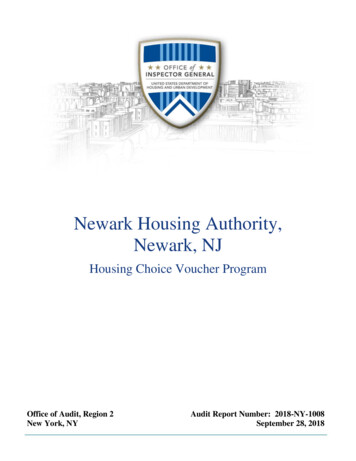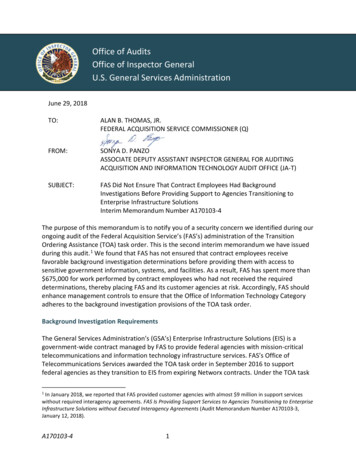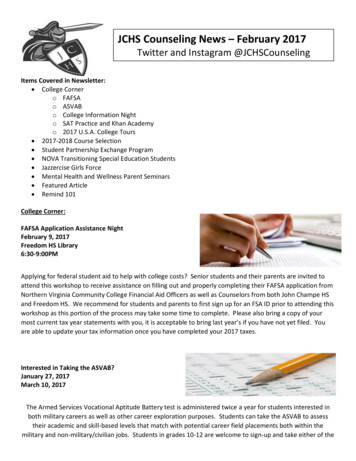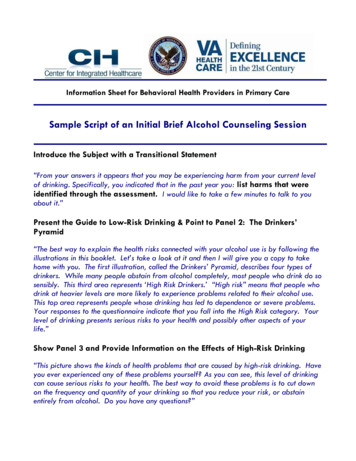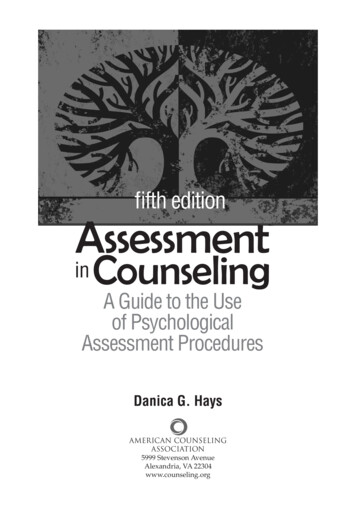
Transcription
VOLUME 07, ISSUE 09MAY/JUNE 2019THE OFFICE OF HOUSING COUNSELING NEWSLETTERTHE BRIDGETRANSFORMING OUR PROGRAM
THE BRIDGE 2INSIDE THE ISSUELetter from the Deputy Assistant Secretary Tips for Passing the Certification Exam on the First Try .HECM Housing Counseling Update: FIT No Longer Available .From Affordable Housing Tenant to Homeowner .Pulling Together to Preserve Homeownership .Oversight Priorities: Fiscal Year 2019 .Working Together to Protect Housing Counseling Funds . .Virginia Housing Development Authority’s Certification Challenge From the Field: A Rural Agency’s Approach to Certification . .Building the Vision for the Next 50 Years .New Communications Tools on the Way .FAQs: Inquiring Minds Want to Know .Editorial Correction Training Digest 34679121416171921232627
THE BRIDGE 3FROM THE DEPUTY ASSISTANT SECRETARY"People don't like change.""You can't teach an old dog new tricks.""If you want to make enemies, try to change something."I LOVE change and love transforming myself through learning, listening, andtaking a chance. I also grow by learning from others, especially those who arebrave and wise enough to show me a better path than the one I'm taking.Housing counselors are in the change business. They transform clients frombeing poor credit risks to having good credit habits, from feeling powerless tofeeling in some control, from poorly housed to better housed. It takes a strongpartnership with the client and a willingness to try different techniques. It takespatience.Sarah GereckeDeputy Assistant SecretaryOffice of Housing CounselingThere are a lot of variables that affect people's ability to obtain, sustain, andretain their housing – and a lot of variables that affect our ability to supportthem. But the one thing that doesn’t vary is our commitment to transformingthe Housing Counseling Program to help change lives.While we continue to support the industry as it exists now, know that we’re also building a vision for the next 50years of housing counseling, setting priorities to ensure we effectively advance that vision, and continuing todeliver tools and resources that help counselors and industry professionals implement that vision. This continuedevolution allows us to better meet the needs of housing counseling agencies, which, in turn, allows these agenciesto deliver the highest quality of housing counseling.In this issue of The Bridge, we explore some of the ways that the Office of Housing Counseling and its participatingagencies are already engaged in transformative work. In particular, the articles discuss: Priorities for ensuring that agencies meet program standards, demonstrate good stewardship of federalfunds, and provide quality counseling to consumers;Success stories from housing counseling professionals that are changing lives;Agency approaches to motivating and supporting counselors through the certification process;Tools and resources to strengthen communications efforts with diverse clients and consumers; andEfforts to build a vision for the next 50 years of housing counseling.By building a program that better serves participating agencies and their staff, we’re building the capacity to betterserve clients. As you join us on this journey, embrace the opportunity to make transformations that will help youragency make an even stronger impact in the community. We have the opportunity to change lives throughhousing; let’s make the most of it!Cheers,Sarah
THE BRIDGE 4TIPS FORPASSING THECERTIFICATIONEXAM ON THEFIRST TRYSince 1994, Catholic Charities ofChemung/Schuyler, based inElmira, New York, has providedquality housing counselingservices in the rural SouthernTier Region of New York State.Read on to learn how two ofthis agency’s housingcounselors, Jane Sokolowskiand Amy Bell, passed the HUDHousing Counselor Certificationexam on November 1, 2018 andlived to tell about it!KEYS TO PASSINGTHE EXAMPreparing, studying, and takinglots of pre-tests were key topassing the exam on the firsttry. All the studying cametogether when five days werespent with peers completingtwo NeighborWorks courses:HO200 Ready, Set, Prep andHO210 Practice, Study, Success.These two courses simplifiedthe information so counselorscould navigate through the 90exam questions and confidentlyuse their knowledge andexpertise to come up with thebest answers.Pictured from left: HUD-certified Housing Counselors Amy Bell andJane Solokowski of Catholic Charities of Chemung/Schuyler.The examination allows up totwo hours to complete the 90questions. One helpful strategyis to “know what you know.”Go through the exam,answering all the questions youcan without worrying about theones you cannot answerimmediately. If you are unableto answer a question withinone to two minutes, mark it“save for later” and move on.Don’t get hung up on a singlequestion – sometimes later inthe exam that answer might beevident in another question.Is it challenging to be tested onareas that you don’t typicallycounsel in? Yes, it is. Butstudying, taking practice tests,and reviewing the materialreally broaden your knowledgeso you can demonstratecompetency in all counselingareas: financial management;property management;responsibilities ofhomeownership and tenancy;fair housing laws andrequirements; housingaffordability; and avoidance of,and responses to, rental and(Continued on page 5)
THE BRIDGE 5(Continued from page 4)mortgage delinquency andavoidance of eviction andmortgage default.One final valuable tip learnedat the NeighborWorks trainingis to go into the exam with themindset that you are going totake it twice, and the first timeis a trial run. This takes atremendous amount ofpressure off and allows you torelax and think. Does it costanother registration fee if youdon’t pass the first time? Yes, itdoes. It’s worth it to have themindset that it’s okay to take ittwice, especially since HUD willreimburse the fee as an eligibleexpense if the agency is agrantee and budgets its grantfunds for this purpose. You maybe surprised and thrilled topass it on the first try, buthaving that mindset reallyhelps.After passing the certificationexam, a counselor transfers theresults to FHA Connection,which alerts their agency’sApplication Coordinator tovalidate their employmentthrough FHA Connection.A housing counselor will not beofficially placed in the certifiedcounselor database until theiragency’s FHA ConnectionApplication Coordinatorsuccessfully validates counseloremployment in the system.Finally, once your counselors,pass the exam, spread theword! Use social media, thepress, newsletters – educateyour community of the valuableresource they have.IMPROVINGSERVICE THROUGHCERTIFICATIONThe HUD certificationexamination unites housingcounselors and their agenciesin a commitment to providequality, informative, effectivehousing counseling.For over 25 years, housingcounselors at Catholic Charitiesof Chemung/Schuyler haveprovided high quality, up-todate counseling by sharpeningskills and knowledge throughcontinuing education andcertification offered byNational Training Institutessuch as NeighborWorks,UnidosUS, HUD Exchange, andothers. In complying with theHUD Final Rule to certifyhousing counselors, the agencyand its staff are raising the baron professional competencyand agency credibility andinspiring confidence in localconsumers.As a HUD-certified housingcounseling agency withprofessionally certified housingcounselors, Catholic Charities ofChemung/Schuyler is moreprepared than ever to helpconsumers beat the odds byachieving better credit, moresavings, fewer foreclosures,and sustainable, stablehomeownership – and you andyour agency can be, too.Don’t wait until August 2020!Visit HUD Exchange for moreinformation on the exam, andprepare and register atHUDHousingCounselors.com.Good luck and remember weare in this together.
THE BRIDGE 6HECM HOUSINGCOUNSELING UPDATE –FIT TOOL NO LONGERAVAILABLENational Counsel on Aging’s Financial Interview Tool (FIT) is no longeravailable to assist Home Equity Conversion Mortgage (HECM) RosterCounselors. HECM counselors are now prohibited from accessing FITfor purposes of providing HUD HECM counseling. HUD’s Office ofHousing Counseling issued a waiver on February 28, 2019 for thepolicies below that require use of the tool: Housing Counseling Program Handbook 7610.1 REV-5,Appendix 4, section III.C, Step 2HECM Counseling Protocol Handbook 7610.0o Chapter 3.1.b (HECM Counselor Checklist)o Chapter 7-B-12 (Using Financial Interview Tool),attachment B-12FIT helped counselors determine a borrower’s financial status whenthe borrower was seeking counseling on the FHA HECM Program.However, HECM Roster Counselors must continue to determine theborrower’s financial status as part of HUD’s HECM programrequirements and protocol. HECM client files must containdocumentation demonstrating a budgetary analysis was conducted.Specifically, client files should contain, at a minimum, documentationthat demonstrates the following topics were covered during thecounseling session: Household budgetingProperty conditionCurrent health status and medical needsHousehold composition, such as other occupants of thepropertyMarital status, such as widowhood, remarriage, or divorceThe IBIS Software Solutions Reverse Mortgage Analyst online tool foranalyzing loan product comparisons, financial assessment analysis, and10-question tracking is still operational and required for all HECMcounseling clients. Additionally,the publicly accessible,downloadable, and printableversion of the BenefitsCheckUpremains available and shouldbe utilized as appropriateunder current HUD policies.HECM Roster Counselors mustcontinue to meet all otherstatutory and regulatorycounseling requirements andpolicies as stated in the HUDHandbooks. HUD will continueto monitor compliance withthese requirements during theagency performance reviewsconducted as part of ongoingoversight activities. Effectiveoversight in combination withthe existing HECM FinancialAssessment required fromlenders will allow HUD tomaintain strong consumerprotections.Please refer questions to yourHUD Point of Contact or emailhousing.counseling@hud.gov.
THE BRIDGE 7FROM AFFORDABLEHOUSING TENANTTO HOMEOWNERSJHP GOES THEDISTANCE FOR ACOUNSELINGCLIENTIn 2014, Ricardo Torres was anaffordable housing tenant of St.Johns Housing Partnership (SJHP)in St. Johns County, Florida,working hard to pay his rent. Buthe had a dream that he waswilling to work just as hard toachieve. His first step was to availhimself of the free creditcounseling available to him atSJHP. “I asked him what his goalswere in counseling,” said DeAnnaO’Flaherty, Community OutreachManager and Housing Counselorat SJHP. “His goal was to moveout of his rental and purchase hisown home.”In formulating a plan to achievethat goal, O’Flaherty knew thather client faced two primaryhurdles. “One of the biggestobstacles was that he was a singleman and has one income. So, hisinitial focus was to try to improvehis income and savings overtime.” The second challenge, shesaid, was more formidable. “It’svery expensive to live in St. JohnsCounty. We work in a marketwhere someone may qualify for amortgage—we’re excited forthem, they’re saving andfollowing the budget, their creditis great—but there may benothing that they can afford. It isheartbreaking to see someonework that hard forhomeownership and then not beable to buy something.”There was an answer, andO’Flaherty knew Torres’ creditwas sufficient to qualify for it:Habitat for Humanity.HAMMERINGOUT A SOLUTION“Habitat for Humanity, St. JohnsCounty was the best fit to leadhim toward homeownership,”O’Flaherty shared. In April 2017,Torres applied. “They did a needsassessment. He was then giventhe opportunity to do some goodfaith hours volunteering prior tobeing selected, so he would knowhow hard the work would be. Hepassed those steps with flyingcolors, and that July he wasaccepted. He worked with [U.S.Department of Agriculture] topurchase a lot in the city of(Continued on page 8)
THE BRIDGE 8(Continued from page 7)Hastings, and then he beganbuilding his property.” Onceagain, Torres found SJHP goingthe extra mile in a way no onecould have expected. KelseyWainwright, SJHP LoanProcessor, had also been selectedfor a Habitat home. Torres soonfound her, hard hat and all,putting in volunteer hours on hishome on weekends. Then, onHabitat’s annual Women’s BuildDay, the entire office staffshowed up to join in. “When theysay sweat equity, they mean it,”said O’Flaherty. “It was a hot day.We feel so blessed that we couldphysically put our hands on thetools, the walls, the floor of thehouse being built for our tenantand housing client who was nowgoing through this amazingaffordable housing option.Ricardo was very humble duringthe entire process, putting a lotof extra time into his build. Hereally does exemplify what hardwork and stick-to-itiveness cando to improve someone’shousing situation.”“AN AMAZING TRIUMPH”Ricardo Torres closed on his home in March 2018, nearly four yearsafter he began the counseling process as a renter. He had surpassed theHabitat St. Johns sweat equity minimum of 250 hours by 100—coincidentally equal to the increase in points in his credit score. At thecelebratory ribbon-cutting ceremony, Torres tearfully thanked family,friends, and volunteers who helped him build his dream and then cutthe red ribbon with gold scissors. “That was an amazing triumph,” saidO’Flaherty, “and we felt such ownership. Ricardo was our tenant. It wasa long process, and he had worked so hard.”It’s a triumph, O’Flaherty said, that illustrates the importance of acooperative effort between agencies, resources, and the client tocreate a successful outcome. “Housing counselors have to be willing toengage across a lot of different programs to make homeownership areality for clients,” she added. “That’s one of the biggest hurdles thatany homeownership program faces. We really need to be familiar withthe many banks, lenders, and community programs that are out there.If I had not been aware of the requirements of Habitat for Humanityand the time frames in which he would need to apply, I would not havebeen able to find Ricardo a resource. He wouldn’t have qualified forenough mortgage to buy something in our area.”Ricardo Torres is just one example of the power of perseverance in thehousing counseling process. In O’Flaherty’s words, “If housingcounseling was easy, I don’t think anyone would like it. We see itsvalue because it is hard. I think the takeaway from Ricardo’s story isthat when a client is working toward homeownership, it can take longerthan you want it to, and it can take a lot more organizations orprograms being involved. But in the end, they win a mortgage for 20 to30 years – a huge commitment – and that’s no small thing. So, beingable to be excited for the client and with the client, even if it takes a lotlonger than you thought it would, is worth it. It really is. I don’t thinkpeople know how rewarding housing counseling can be.”
THE BRIDGE 9PULLING TOGETHER TOPRESERVE HOMEOWNERSHIPTHE HOPE NOW ALLIANCEFor homeowners, crisis comes in many forms—an economic downturn, the forces of nature, an abundance ofuncontrollable personal circumstances. For more than a decade, HOPE NOW has been a port in the storm forhomeowners facing the loss of their homes. HOPE NOW is a nonprofit alliance of housing counseling agencies,mortgage companies, investors, and other mortgage market participants committed to working to keeppeople in their homes.“HOPE NOW was created in collaboration with HUD and the U.S. Treasury,” says Eric Selk, Executive Director,“the idea being that collaboration between the nonprofit industry and the mortgage industry would bebeneficial to borrowers out in the field. We are a very unique nonprofit in that our membership is themortgage servicing industry.”Housing counseling agencies play a significant role in the organization’s home preservation initiative,partnering to provide borrowers with debt management, credit counseling, and foreclosure preventionservices. “We work with them on the local level as well as the federal level,” adds Selk. “Sometimes we'll workwith an intermediary office on activities. It varies by the project that we're doing and the goals we're trying toaccomplish.”(Continued on page 10)
THE BRIDGE 10(Continued from page 9)served over 500 families. Wewere in Puerto Rico for sixweeks in coordination withFEMA and their disasterassistance centers.”DEALING WITH DISASTERSIn addition to connectingrenters and homeowners withorganizations that providedisaster recovery supportservices, housing counselingagencies play a critical role inhelping clients manage theirpost-disaster financial situationand navigate the complexitiesof disaster recovery assistanceprograms.Nothing is more devastating to homeownership than a naturaldisaster. Housing counseling agencies are well positioned to helphomeowners and renters after a disaster. When they occur, HOPENOW is quick to live up to its name. The impact of a natural disaster isnot only the immediate aftermath but also the very long recoverytimeline that follows. “Usually in that early disaster recovery period,there are specific programs on the ground,” says Selk. “The mainplayers are the Red Cross, the United Way, and the Small BusinessAdministration. You can take out a loan from the Small BusinessAdministration, and that's what families need sometimes, just a quickinfusion of cash. HOPE NOW uses housing as a catalyst to bring theavailable resources together and get the mortgage servicingcommunity to promote them and connect their homeowners withthem. We also work to get the nonprofits to play a role.”AWARENESSAND SYNERGYThe organization quickly galvanizes industry players. Educational flyersgo out to the community. Available resources are convened into faceto-face assistance events where homeowners discuss their issues andlearn their options and opportunities. “We really try to be sensitive tothe market and what the resources are, bring them together, put out abroad message into the community that people can get help, and thendo the best work we can for that time on the ground. We were inNorth Carolina two days for face-to-face assistance,” Selk recounts.“After Hurricane Harvey, we brought together a two-week event that“The majority of people haveno idea of all the free resourcesthat are out there,” Selk added.“The last disaster-relief eventwe did was in Beaumont, Texas.The majority of people weserved were low-to-moderateincome. Out of the 192 familieswe met that day, it's safe to saythat 50 percent of them had noOne challenge is thatconsumers are not aware of thehelp that is available to them.Housing counselors fill thatknowledge gap by helpingclients access resources thatwill help them obtain rental,mortgage and tax relief; findtemporary housing; and applyfor government recoveryprograms.(Continued on page 11)
THE BRIDGE 11(Continued from page 10)“The thing is,” says Selk,“disaster coalesces a group ofpeople. The disaster is theactivating agent to geteverybody together, to geteverybody in the same room. Ifnot for a disaster, they may ormay not be socializing thoseprograms with each other.”GETTING ASMUCH AS YOUGIVEidea that Habitat for Humanity was a resource in their own community.There were other free builders who were being funded throughvarious disaster charitable dollars. Those families had expended theirinsurance, and they needed to know what to do. They were beyondthrilled.”Serving homeowners in disaster areas, he explains, is vitally dependenton pulling together all available resources. For example, Habit forHumanity and Catholic Charities can provide rebuilding and temporar
The IBIS Software Solutions . Reverse Mortgage Analyst online tool for analyzing loan product comparisons, financial assessment analysis, and 10-question tracking is still operational and required for all HECM . c

